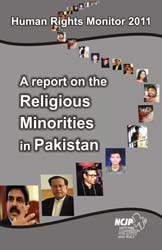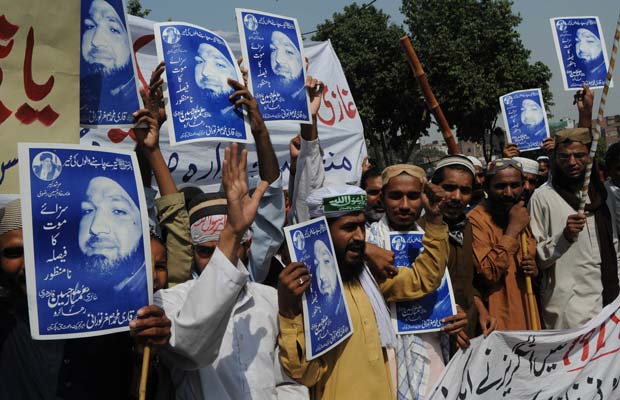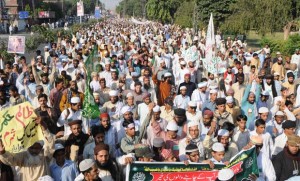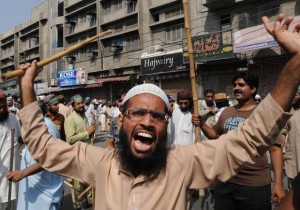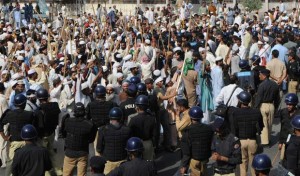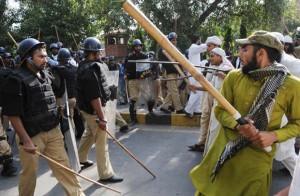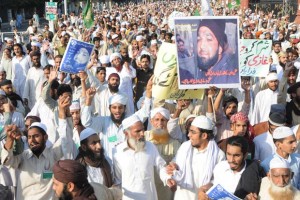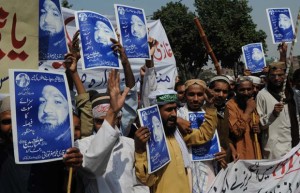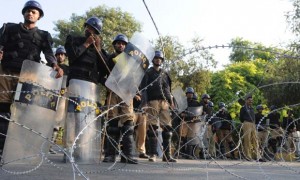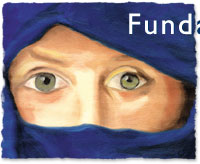
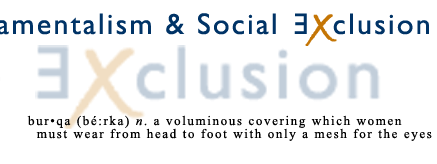
The emergence of fundamentalist movements in Muslim countries, more properly known as Islamism, is being viewed by some scholars as the last wave of anti-imperialism of the 20th century. Muslim fundamentalist movements that show militancy against Western colonial influences include the Hezbollah and AMAL in Lebanon, the HAMAS in Palestine, the National Islamic Front in Sudan, the Islamic Salvation Front in Algeria, the Muslim Brotherhood in Egypt, Khomeinism in Iran, the Jamiat-I-Ulema Islam (with its multiple splinter groups) in Pakistan, the Mujahideen and the Taliban in Afghanistan.
While the Islamists have different interpretations of the Sharia (Islamic jurisprudence), they believe that all Muslim societies are subjugated and subordinated because of their deviation from the true Islamic path. When Islamists blame the West for co-opting their leaders, they also use Islam as a political ideology to mobilize the disenfranchised Muslim ‘Umm’ (community of believers) against the “corrupting” and “self-serving” ways of the West.
Gender and Muslim Fundamentalism
Women form the core of Islamist debate. Muslim fundamentalists across the board agree on restoring complementary roles between men and women based on their biology – men as wage earners and women as mothers and homemakers. Given the traditional, patriarchal Muslim view of women’s sexuality being ‘disruptive of the social order because of her power to attract the opposite sex,’ Islamists demand that women be veiled and segregated from men at every level of society.
The extremist behavior of fundamentalists and Islamists in particular has proved harmful for the rights of women wherever they have captured state power. Their promulgation of “Islamist” laws and policies in Pakistan, Iran and Afghanistan, have introduced even more patriarchal norms into these predominantly feudal and tribal societies, and attempted to erode their existing diversity.
The Veil and Four Walls – Women in Pakistan
The Islamists supported the military government of Zia ul Haq, who took over in a military coup in Pakistan in 1977 and ruled for the next 11 1/2 years. This was the period when the concept of ‘chadar and chardiwar’ (veil and four walls) was pushed upon Pakistan women. Women began being discriminated against in the workplace and in the streets. The state used the electronic media to mount scathing attacks on working women and projected the “Islamic woman” as devoted to home and family.
The Zia government passed a series of laws against women. The Zina Ordinance (part of Hudood Ordinances, 1979) makes sex outside marriage a crime against the state. It also does not give maximum sentence on the basis of women’s testimony. Discounting women’s testimony has to date resulted in imprisonment for thousands of poor women, who have been accused of adultery or even been victims of rape. In addition, the equality granted to women under Pakistan’s constitution was subverted with the passage of the Laws of Evidence, 1984 (in which two women’s testimony is equated with one man in financial matters) and the Qisas and Diyat Ordinance, 1985 (in which the blood money for a deceased woman is half that for a man). 1
The effects of the Islamist ideology have seeped into the rural areas of Pakistan where customary laws hold sway. In the last two decades there has been an appreciable increase in tribal customs like honor killings in which the unfortunate woman and her lover can be killed by her immediate family and get away with a lesser sentence.
Religious Minorities in Pakistan
The Blasphemy Laws, passed by General Zia ul Haq have deprived religious minorities in Pakistan – Christians, Hindus and Parsees (Zorastrians) – full citizenship. These laws award the death penalty for anyone charged with ‘blasphemy’ against Prophet Mohammed. At times they have been used as a pretext against non-Muslims who might be involved in a land dispute. Blasphemy charges are also used against the Ahmediya community, who offend the sensibilities of the mainstream Muslims by denying that Mohammed is the last Prophet.
Religious minorities in Pakistan have become further isolated because General Zia’s introduction of separate electorates. The latter requires non-Muslims to elect non-Muslim candidates. With reserved seats for non-Muslims, candidates are now required to contest elections on a countrywide basis rather than from a particular region. This, as non-Muslim voters have testified, makes the candidate unaccountable to his particular constituency and leads to a further neglect of the religious minorities.
The Classic ‘Islamist’ State – Iran
Iran has even less diversity than Pakistan in terms of its religious sects, ethnic communities and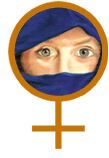 women’s movements. The Shia clerics who ushered in Ayatollah Khomeini’s revolution in 1979 had been in power for only two weeks when they decreed that women ought to be veiled and segregated. Iran became the classic ‘Islamist’ state where Khomeni received support from all sectors of society, including women, against the Shah’s pro Western policies. Once victorious, the Shia clerics pushed women into the veil, after referring to those in Western dress as “Westoxicated” and, the “painted dolls of the Shah.”
women’s movements. The Shia clerics who ushered in Ayatollah Khomeini’s revolution in 1979 had been in power for only two weeks when they decreed that women ought to be veiled and segregated. Iran became the classic ‘Islamist’ state where Khomeni received support from all sectors of society, including women, against the Shah’s pro Western policies. Once victorious, the Shia clerics pushed women into the veil, after referring to those in Western dress as “Westoxicated” and, the “painted dolls of the Shah.”
One of the first acts of the Khomeini government was to suspend the Shah’s Family Protection Act. In one go, women lost all their rights of family law. Although the FPA was restored in amended form in 1992, Iranian laws presently weigh heavily against women. Women are treated as subjects within marriage: men can divorce more easily and remarry without seeking permission from their wives, polygamy is more common, temporary marriage has been re-instituted and child custody made more difficult for women. The legal age for marriage for girls has been dropped to nine years, eliminating their chances for finding a life outside marriage and motherhood.
Perhaps the biggest challenge to middle-class women in Iran is the gender
segregation in education and employment. Female literacy has dropped. At the same time, forbidding girls to be taught by male teachers has significantly narrowed their education opportunities. Women’s employment has increased marginally after the 1979 Islamic revolution, but only because of their induction into sex segregated occupations like teaching, “female oriented” fields of medicine and in government agencies that deal with women.
Since the death of Khomeini in 1988, a relatively liberal breed of Shia clerics (presently led by President Khatami) has encouraged “Islamic feminists”. The latter, who are “deconstructing” the Quran and Hadith (sayings of the Prophet) work with secular feminists to improve women’s rights in Iran. They have had limited success. Even these “Islamic feminists” occasionally risk the wrath of hard-line clerics by publishing articles by women poets and interviews of filmmakers from outside the mainstream. Even more likely to get arrested are unveiled women or those espousing secular views.
Inside the Burqa – Outside the Decision-Making Process. Women in Afghanistan
The Taliban, a Pashtun ethnic group who have ruled Afghanistan since 1995, rode the wave of Islamic militants brought into the region by the United States, Pakistan, and Saudi Arabia to fight the Soviet Union’s invasion of Afghanistan. Though the Taliban has an Islamic fundamentalist image, its practices are tribal rather than Islamic. For example, it allows the ‘Jirga” (consultative body of male tribal elders) to make communal decisions on the basis of the Pashtunwali code of honor and shame. Women are totally excluded from participating in this decision-making process.
Since the Taliban took power in Afghanistan, they have imposed the ‘burqa’ – a voluminous covering which women must wear from head to foot with only a mesh for the eyes. Women have been barred even from their Islamic rights of inheritance. Instead, the Afghan tribes are now resorting to a pre-Islamic custom whereby widowed women are being inherited by their brother-in-laws or stepsons. Also, stricken by dire poverty, Afghan farmers (who previously received a bride price for their daughters) are now selling their daughters to pay off loans.
Today Afghanistan tops the list of fundamentalists attempting to stamp out diversity. About 100,000 women teachers, doctors, nurses, administrators and civil servants, who worked mostly in Kabul, have been sent home. Primary schools for girls have been closed (for want of women teachers), while Kabul University – once bustling with female students – has been closed to women.
Religious Minorities in Afghanistan
From time to time, the Taliban clashes with the other minorities – Hazaras, Tajiks, and Uzbeks – who remain unrepresented in this Pashtun based government. Tajik leader Ahmed Shad Massoud continues to fight the Taliban from the North of Afghanistan. In addition, the Sunni Taliban and the Iranian Shia militants have been sighting their battles on Pakistani soil. This has created sectarian clashes between the Shai and Sunni population in Pakistan, mostly to the detriment of Pakistan’s minority Shia population.
The Islamic fundamentalists export of terrorism to the West has now come full circle. Indeed, if any lessons are to be derived from the emergence of Islamists, it is to recognize that the West acted short-sightedly in the background of the Cold War and the oil crisis. The U.S. support to the fundamentalist regimes in Pakistan and Afghanistan not only weakened Pakistan and Afghanistan’s civil societies, it sparked the return of illegal immigration, heroin, debt liabilities and terrorism. It is high time the UN, world governments and religious leaders realized that a hard-line approach to the Muslim world will only elicit more fundamentalist responses – to the detriment of all concerned.
Nafisa Hoodbhoy has worked as a journalist for the last 16 years in Karachi, Pakistan for the English language daily newspaper,`Dawn’. In 1995 she was nominated by Amnesty International as a ‘human rights defender. Presently, she is a Visiting Lecturer at Amherst College, teaching a course on the `Regulation of Sexual Activities and Identities’ relating to Pakistan, Iran and Afghanistan.
Source: ICSW

